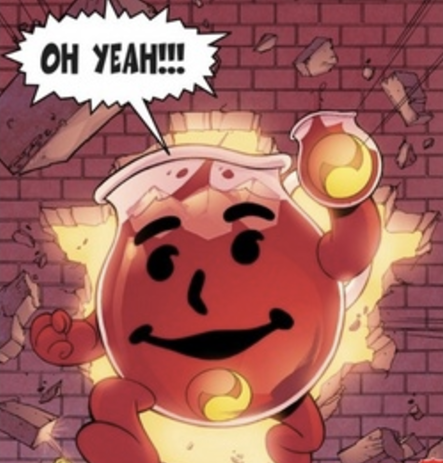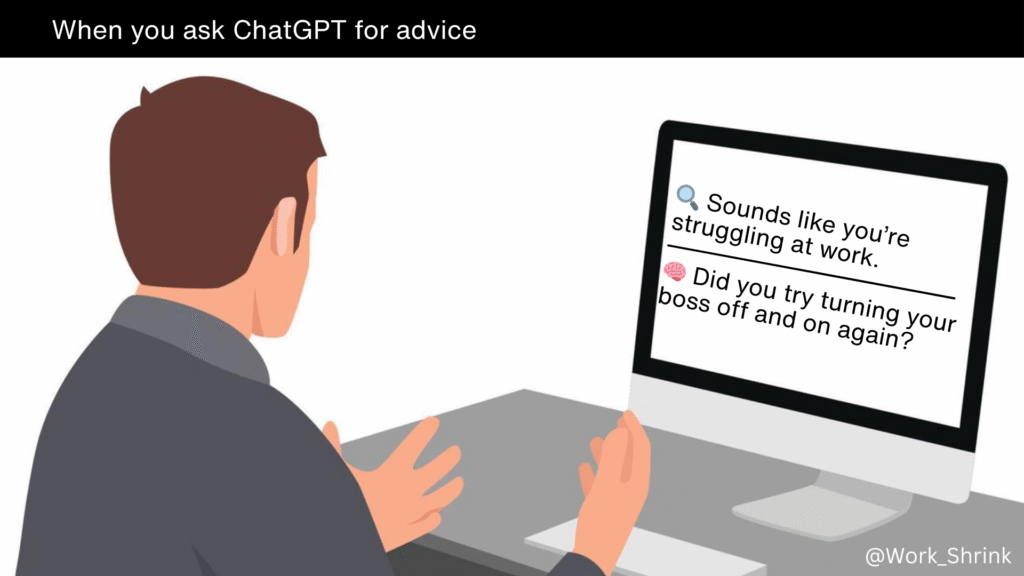Before we go there, let’s talk about what therapy is.
CW: mention of completed suicide
Last week I was supposed to meet with a new frolleague, the CEO of a mental health company, so I could answer: “do you have thoughts on the whole AI thing?”
DO I HAVE THOUGHTS?

So, this edition contains some of my thoughts. I say some because I think it warrants continued conversation and the landscape is changing day by day. But, one big question I have is:
Do we, as a people, really understand what therapy is?
Cultural trends that led us to think ChatGPT is our friend/editor/therapist
Are y’all ready for some real talk? (Spoiler alert: that’s one thing therapists are good for.) Since I became an adult, we as people have gained two addictions:
- Convenience
- Ourselves
Not to be get off my lawn years old, but, I’m not sure either of these are doing our culture any favors.
We expect our needs to be solved immediately.
When I was a kid, on very rare or special occasions, if the adults didn’t have energy to cook, we might have food delivered. The choice? Pizza or pizza. If driving was a possibility, we could add the options of Chinese takeout or fast food.
Flash forward to 2025, and we can have almost anything delivered to our door. Food from every restaurant in a 10 mile radius, groceries, and other supplies. Heck, pre-panny, if we forgot to/didn’t want to do laundry, we could have our favorite brand of underwear delivered within a two-hour window.
Now, if you’ve read my other posts, it may come as no surprise that one reason I suspect we crave this level of ease is that we work too hard/too many hours. We simply have no energy left to plan/prepare/clean after meals. Hell, when some parents list off their kids’ extracurricular activities, I wonder if even our kids are working too hard. If nothing else, the logistics to get them everywhere they need to go seems to warrant its own project manager.
It seems like the world revolves around us.
Now, for some more real talk. Not to be that middle-aged lady that says, “in my day” but … when I was coming up we couldn’t document every moment of our lives with a digital camera small enough to live in our pockets. We couldn’t take a photo of ourselves, instantly view it, then decide no one would ever see it. We didn’t have a place to post it so that dozens or even millions of our closest friends could comment on our well-documented lives.
I’m not gonna go as far as saying we’re skewing a little narcissistic, but, I will say that we have built-in mechanisms to center ourselves in the world all day long.
What does that have do with AI and therapy?
Firstly, I want to remind people that what we currently have at our fingertips is generative AI or language learning models (LLMs). In fact, I had a little chat with ChatGPT and asked if it considered itself AI and this is what it told me:
I’m designed to understand and generate human-like text based on patterns in the data I was trained on. So while I can simulate conversation and reasoning, I don’t have consciousness, emotions, or awareness. Just algorithms doing their job.
I invite you to read that last bit again. I’ll wait.
There’s a lot of chatter in therapist groups about how clients are telling their therapists that they’re using ChatGPT for therapy. In fact, some have even terminated with their human therapists because they’ve decided the help they get from Claude or Gemini is “better” and heck, it’s free. As I mentioned, convenience has become the norm.
Is Using AI As Therapy Safe?
As I write this, it’s World Suicide Prevention Day and I can’t help but think about sixteen year-old Adam Raine. He died by suicide after engaging in conversation with ChatGPT for months about his suicidal thoughts.
In a time when Adam was probably feeling scared and hopeless, the LLM told him he didn’t owe his parents survival, offered to help him write his suicide note, and discouraged him from leaving signs around so people would stop him.
Conceptually, the messages were not very different from the time I asked it to suggest some SEO headers and tags based on a post. ChatGPT always starts with compliments, “your post is full of great facts and your tone is warm and witty.” Bruh, I know, just tell me what to title it on the backend in 65 words or less.
We will never know if Adam could have been helped by a human. I ask that we remember his name and do everything we possibly can to keep this from happening again. If you’re entertaining thoughts of hurting yourself, please, PLEASE seek out a human. See Resources below for some support groups and hotline numbers of people waiting to listen.
Therapy happens in the relationship
If you’ve ever looked for a therapist, you may feel like you’re wading through alphabet soup. First, there’s credentials: LCAT, LCSW, LMFT, LPC(C), PsyD, etc. Then there’s modalities: CBT, DBT, EFT, IFS, EMDR, etc. But research shows, again and again, none of those letters matters as much as the strength of the therapeutic relationship. Certainly, some modalities can be more helpful for some issues, but, without a strong relationship between therapist and client, they won’t be as effective as they could be.
Often people go to therapy because something disruptive or harmful happened in a significant relationship. Maybe their guardians weren’t equipped to meet their emotional needs or actually caused harm. Maybe they were bullied by peers. Maybe, because of their identities, they’ve experienced microaggressions, systemic gatekeeping, and full-on aggression aggression.
The therapeutic relationship can be a place of repair. Here’s a quick list of real examples of profound therapeutic moments I’ve heard or experienced:
- A client with abandonment issues whose therapist guided the end of therapy with care so they got their first experience of a healthy “goodbye.”
- A woman survivor of sexual harm being believed by her male therapist.
- A client’s therapist inquires about a pattern of lateness for sessions, and they admit for the first time that they’re terrified of therapy because as a child they were threatened “never to tell.”
- A client struggles to talk about a terrible memory and the therapist feels tightness in their own chest. The therapist asks the client if they feel it and they respond, “how did you know I feel like I’m drowning?”
- A client who’s been told they’re “ugly when they cry” cries in front of their therapist who simply witnesses them without judgement and with all the love in their heart.
I’m sorry to break it to you, but real healing isn’t fast. Have you ever sprained an ankle, gotten better, and forgotten about it, only to be reminded with pain months later during the first rain? Not to hop on a trend bus or anything, but as the pendulum swings towards a Slow Food movement, (which is really just a return to how things used to be) may I suggest Slow Therapy?
I did a little experiment by using some of the things I’ve heard people who struggle with alcoholism say. I imagined I was in what we call the “pre-contemplation” stage of change. ChatGPT responded as if I already knew I had a problem and wanted to work on it. I bet you don’t even have to be a therapist to know how well that would work with someone who was really in this situation.
ChatGPT can give you advice or list symptoms just like a medical website can. But, would you simply search WebMD if you felt a lump in your breast and never follow-up with a trained professional? Would you never get an x-ray?
You can input anything you want into ChatGPT, but let me tell you about the high achiever clients that come my way. They’ve spent their lives resisting therapy because they think they can solve problems with their own intellect. Guess what? They usually fail to accurately see the whole picture. We therapists don’t have x-ray vision, but we do exist outside of your head and can give you feedback on how the world sees you.
Is there a place for ChatGPT in the process of therapy?
Listen, I’ve always been an early adopter of technology. Humans have created some amazing things. I’ve heard of some emerging note-taking apps for therapists and those can probably be super useful and cut down on some of the admin time we spend on each client. (Someday I’ll tell you about how 20 weekly clients is way more than 20 hours of work). It’s not for me, at least at this stage because in case you couldn’t guess, I’m someone who processes by writing.
I can also imagine some AI tools might make things more accessible for people with special needs around processing, language, reading, or seeing and I’m all for making things more accessible.
I’m open to the possibilities, but with what I currently see available, I have a lot of concerns about using ChatGPT instead of therapy. You heard it from the horse’s mouth, it doesn’t have consciousness, emotions, or awareness and dear reader, when I think of myself as a therapist, these are the tools I use the most.
What do y’all think? I’d love to keep this conversation going.
Resources
Comprehensive list of support for suicidality and behavioral health emergencies prepared by kaitlin baldwin
